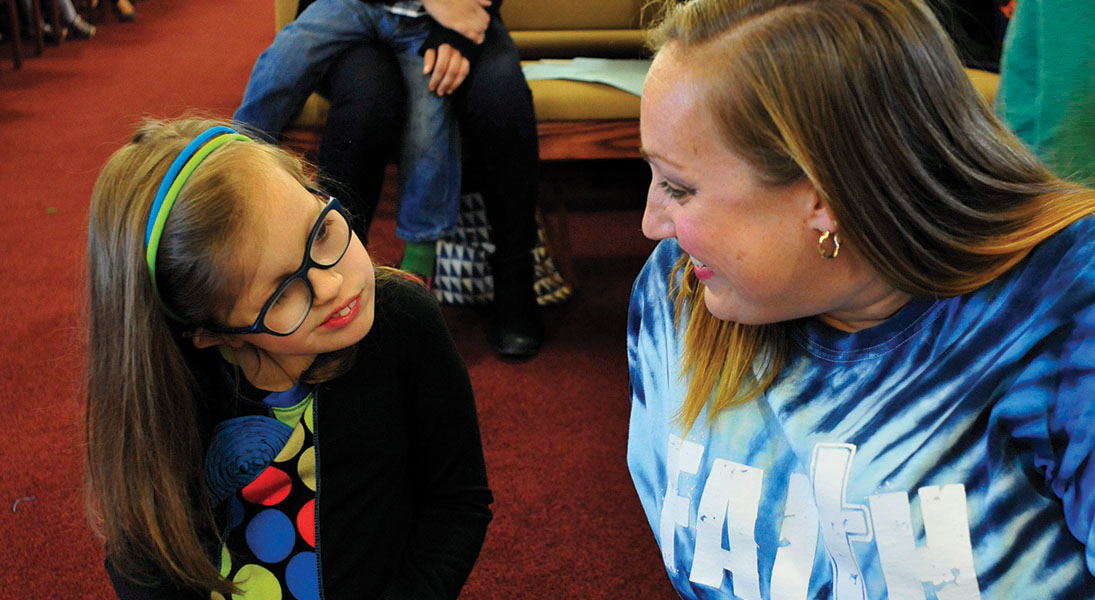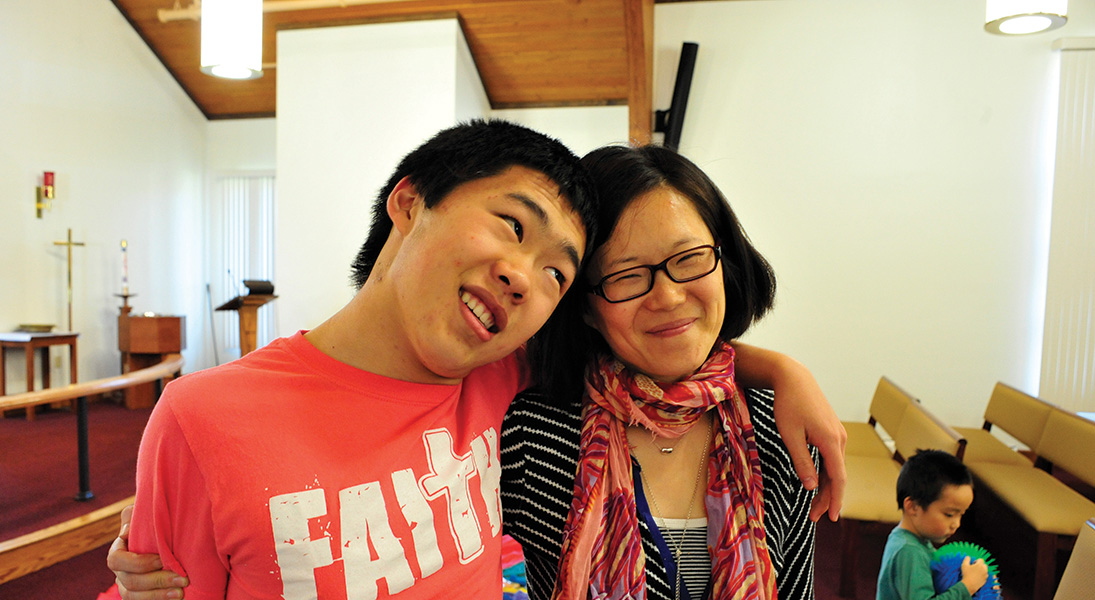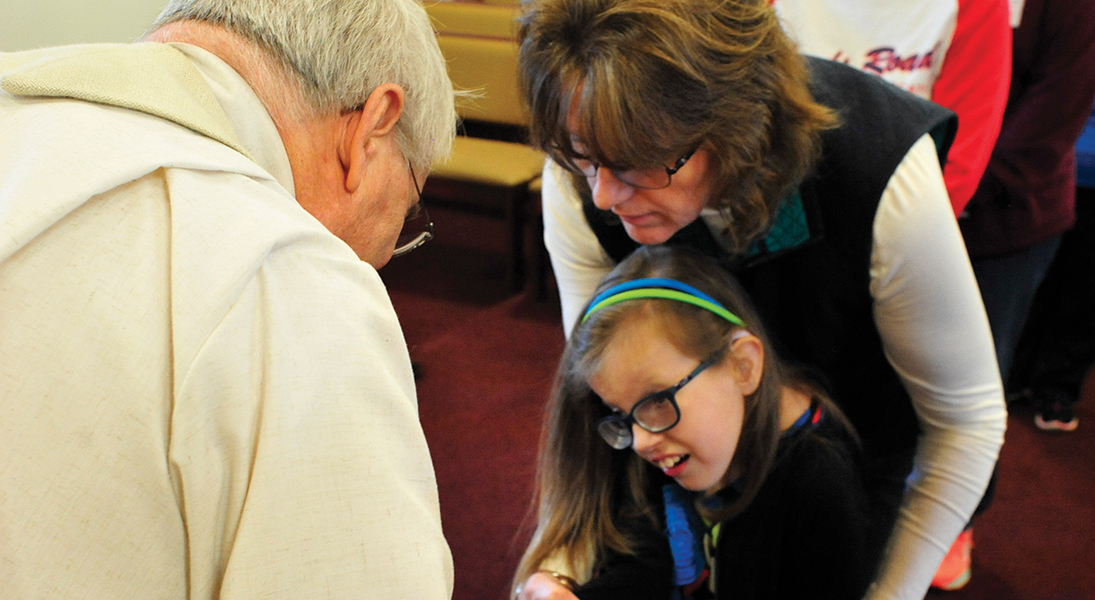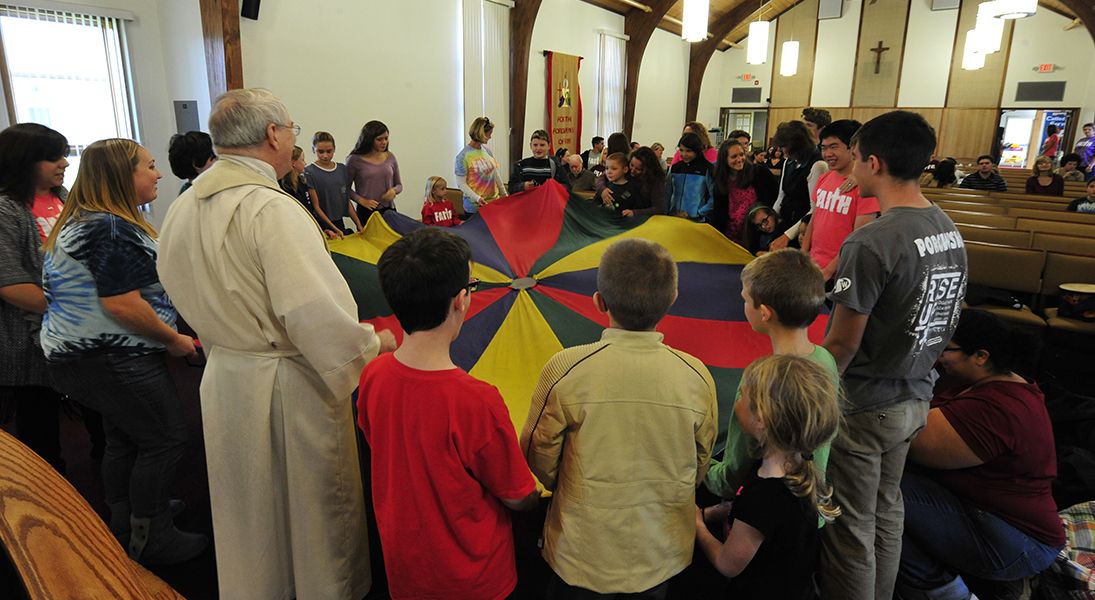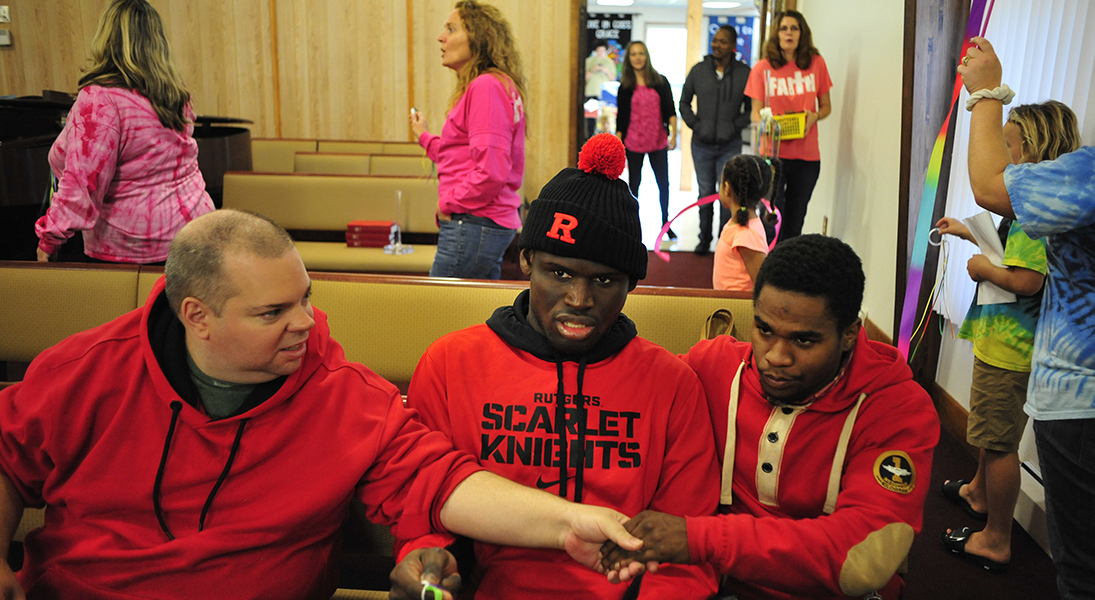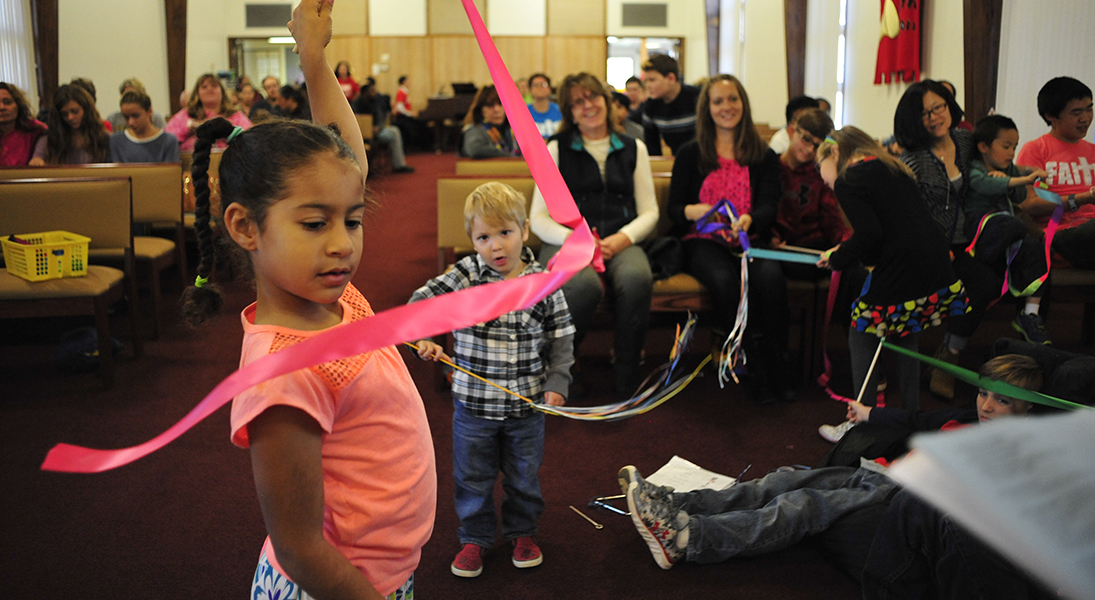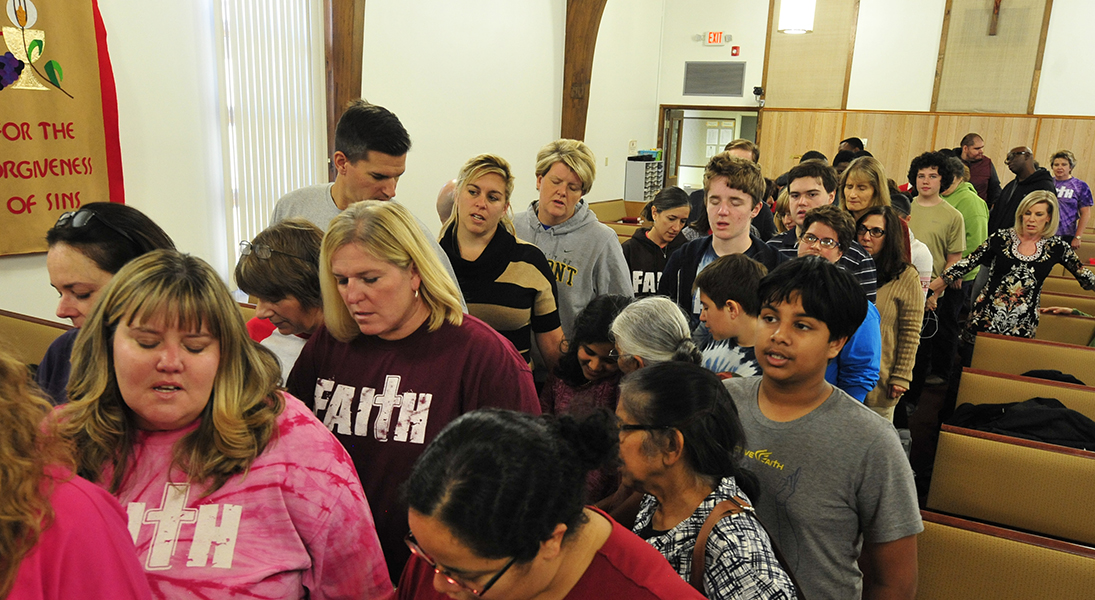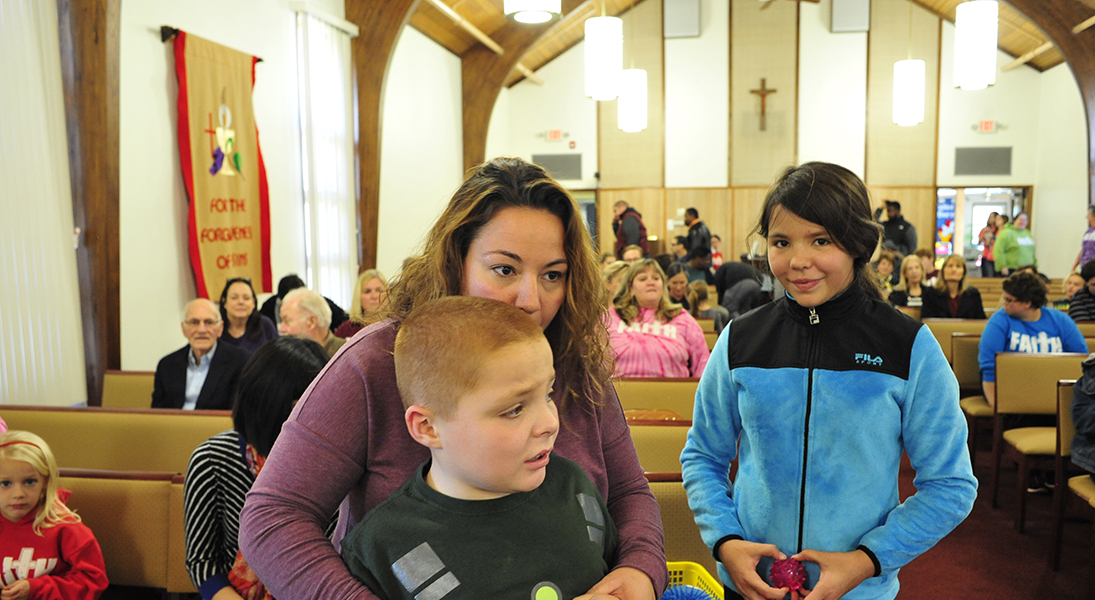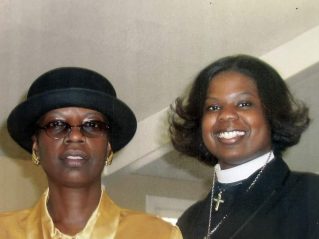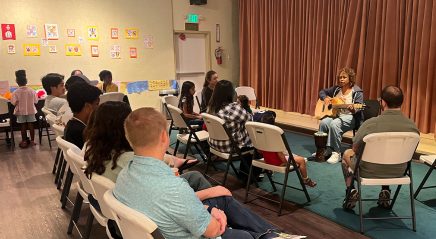It starts with a parachute in the sanctuary. Children and adults of all abilities hold its edges and lift multicolored sheets up and down while singing “Jesus Loves Me.” Jayden Clarke, who is 4 and full of energy, is often the first to go into the center, where he is surrounded by billowing fabric, smiling faces, and love and acceptance.
This is Joyful Noise.
Jayden was diagnosed with autism just before his third birthday. Since he can’t sit still or stay quiet for long, it’s hard for his entire family to attend worship without fear of bothering others. But Jayden and his family find solace at Joyful Noise, a monthly service for children and adults with special needs at Faith Lutheran Church, Hillsborough, N.J. “This was a way for us to go as a family to church without any type of looks and everyone can just be themselves,” said his mother, Jessica Clarke. “When we’re at the Joyful Noise service, we’re all in the same boat.”
Parachute time and the well-loved hymn is Jayden’s favorite part of Joyful Noise. Clarke appreciates the welcoming atmosphere and how comfortable it makes her daughter Morgan feel as the sibling of a child with special needs.
Hearing the call, meeting the need
Clarke learned about Joyful Noise when her friend Tori Wargo, a special education teacher, posted about it on Facebook. Wargo and Allyson Williams, another member of Faith and a special education teacher, launched the service in November 2015.
They got the idea from Faith’s pastor, Bill Zimmermann. “I had read an article about a church doing something similar and was moved by the comments of families who had been touched by the service,” he said. “I remember thinking what a wonderful ministry and what a wonderful thing to offer to folks who felt excluded.”
Zimmermann gave Wargo and Williams a copy of the article, asking them if this was possible for their congregation. “Once they read it, they kind of ran with it,” he said.
The teachers started with visits to two similar services in New Jersey and then met with Zimmermann to brainstorm. They shared what they loved and discussed what could be adapted for Faith’s context. And thus, Joyful Noise was born.
“We thought ‘Joyful Noise’ was the perfect name,” Wargo said. “When you have a special-needs child and you have to go to a place where the expectation is silence, there is such a level of anxiety of parents. To be able to sit and say, ‘It’s OK, the noise you’re going to make is absolutely joyful, that’s music from God,’ is such a comfort.”
Services last approximately 30 minutes and are filled with music, movement and special moments for guests of varying abilities. There is the “joyful noise hymn,” during which each participant receives an instrument to play. Zimmermann also delivers a message and administers communion. The service ends with a hymn and jubilant cross parade, an idea Wargo and Williams adapted from one of the churches they visited. Each worshiper receives a cross to hold as they march around the sanctuary.
Drawing in people from varied denominations, the service averages 30 attendees each month. And it’s growing: recently residents of group homes for adults with special needs have been bused in to participate.
Looking back, Wargo is filled with gratitude for the growth she’s witnessed in her congregation and in the life of the families with special needs. “There is not one service where we haven’t cried. You are so uplifted when you sit here,” she said. “It’s become much more than a worship service.”
“This is the work of the Holy Spirit”
Robbie Watts is 14 and on the more intense level of the autism spectrum. For many years his mother Michelle couldn’t bring him to worship at Faith. “No one ever saw him but everyone knew him,” she said. That changed when Joyful Noise began.
At first it was hard to get Robbie in the door, Wargo said. Later he came in but wouldn’t move from his adult-sized stroller. Little by little Robbie began to participate more. Today he walks in the cross parade, which is an accomplishment in and of itself, Zimmermann said.
The experience has made all the difference for the Watts family. “Being able to worship with my child in a stress-free, relaxed environment in fellowship with others who acknowledge and welcome special needs is amazing. I truly feel blessed and surrounded by love at Joyful Noise,” Watts said.
Not only have parents like Watts seen a change in their children, they’ve also noticed a change in their spiritual life. “Parents who I have never met before came up to me that very first week to thank me for doing it and to say, ‘You might think you’re doing this for our children, but you’re doing it for us too. For us to know someone cares enough to do this for us means the world,’ ” Zimmermann said.
The pastor gives all the credit to God: “This is the work of the Holy Spirit. Tori and Allyson and I go along for the ride.”
A space to celebrate difference
Esther Kuchipudi’s family had stopped going to church for a number of reasons. For one, her daughter Joey, 11, was difficult to manage and “seemed not to enjoy it.” Joey has apraxia, a speech impediment. Though her and her husband had been raised going to church, they struggled with their faith as a result of Joey’s diagnosis, “trying to wrap your head around why things like this happen.”
When she heard about Joyful Noise, the mother of two said she became really excited—this was a way for her whole family to go to church together. Since participating in Joyful Noise, her family has reconnected with the church and built connections with fellow attendees.
“It’s hard enough to be the parent or the member of a family that has special needs. It’s challenging, it’s polarizing, it’s a very lonely place to be,” Kuchipudi said. “It’s like your heart is broken and it never actually recovers.
“I guess since I started going to this church I feel a little less like that. It’s really nice to go somewhere and know you are not just accepted, you are loved. People want to understand you and know you—it’s community in the truest sense.”
As Joyful Noise organizers consider its future, they hope to sustain the service so it continues into the next 10 to 20 years. Wargo dreams of partnering with other local congregations so the service could be offered to families more than once a month in rotating places. Whatever the future holds, one thing is clear—the ministry is helping more families with special needs children know they matter to the church and that they matter to God, Zimmermann said.
“It matters, it really resonates with me that they’ve created a place to celebrate difference, especially in a climate where our country is right now,” Kuchipudi said. “What they’re doing in that church, that’s what (Christianity) is supposed to look like. This is the heart of Christ.”
What congregations need to know about special needs families
- Parents and siblings of special needs individuals find the experience to be challenging, polarizing and lonely. “When we have a special needs child, the anxiety level you have when you go to a place where the expectation is silence is high,” Wargo said.
- Become aware of and be sensitive to those with special needs in your congregation. “They are part of your congregation just as much as the typical kids are or the typical adults,” Clarke said.
- Special needs families want to be accepted, and they also want people to stop feeling sorry for them. “There’s an unmet need out there. There’s people in our community that don’t have an opportunity to feel welcome in worship. Let’s welcome them here,” Zimmermann said.



